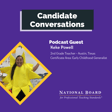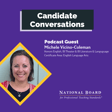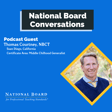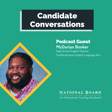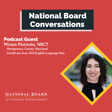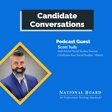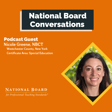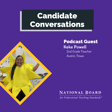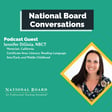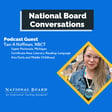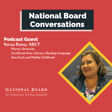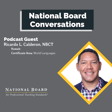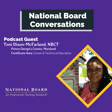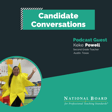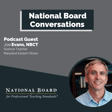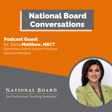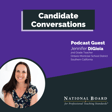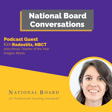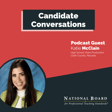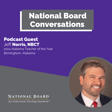Become a Creator today!Start creating today - Share your story with the world!
Start for free
00:00:00
00:00:01

Jonathon Medeiros
Welcome back to National Board Conversations. In this episode, you hear from Jonathon Medeiros. He's a National Board Certified Teacher in Hawaii and joined this episode to talk about the importance of reflective writing and teaching beyond the curriculum expanding the minds and learning environment of your students. You can read more from Jonathon on The Standard.
Be sure to follow us on all our social media platforms to keep up with all National Board-related updates.
Twitter: @NBPTS
Instagram: @NBPTS
Facebook: The National Board for Professional Teaching Standards
Transcript
Introduction with Jonathan Medeiros
00:00:00
Speaker
What's up, everyone? We have our first repeat guest today. I would like to welcome back Jonathan Medeiros. He's a national board certified teacher in Hawaii and recently wrote a blog for us emphasizing the importance of reflective writing and thinking beyond the curriculum. It was a fun conversation and I hope you enjoy it. Here's Jonathan Medeiros. Welcome back to the show, Jonathan, new host, but same show.
Journey to Teaching
00:00:20
Speaker
Can you give us a brief introduction of yourself? Where are we? I'm talking to you from and what are you doing?
00:00:26
Speaker
Yeah, I'm Jonathan Medeiros. I'm here in my classroom on Kauai. I've been teaching language arts for 16 years here at my alma mater, and I've been a National Board Certified Teacher since 2010, I think, with my friend. I just renewed or did my maintenance like a year ago.
00:00:50
Speaker
Nice, nice. Yeah. So I always enjoy hearing these stories of why MBCT's become teachers. So why did you become a teacher? Well, I don't know if I said this before, but the short answer, the glib answer is I became a teacher because of a girl. Like I was in grad school studying literature and writing and one of my plans was like to pursue writing and be a
00:01:17
Speaker
work at the college level but I was not into it when I did it as a grad student and I kind of was just floating around and I met this person who's amazing and she said she was going to go to school to become a high school teacher and I'd never thought about it before and I basically followed her. So
00:01:35
Speaker
know the short answer is because of a girl but the long answer is because I just really love learning and I believe passionately in you know social justice and equity and those are really important things to me to my community and I think I can help with that in the classroom.
Becoming a National Board Certified Teacher
00:01:51
Speaker
So what pushed you to become a national board certified teacher? Well specifically a person here in Hawaii
00:01:59
Speaker
tapped me on the shoulder. And I know we talk about it a lot at the national board, right? Like taps me on the shoulder. Yeah, right. Right. So that happened to me, but like a lot, like it took me a couple of years. She kept tapping me on the shoulder. Her name's Tracy, she's amazing. And so she saw something in me. It took that person to like, say like, Hey, I think you might be interested in this. I think this might be good for you. Um,
00:02:24
Speaker
And then beyond that, it was about that love of learning. Like I'm a curious person, that's how I approach the world. I ask questions about everything wherever I'm at. And so the national board certification process was kind of a natural fit for that, right? So there's so much self-reflection involved. So it was another chance to learn.
Theater vs. Drama in Education
00:02:44
Speaker
So yeah, I mean, so on that topic, you wrote an essay for us that gets into reflective writing and thinking beyond the curriculum. And so we're gonna talk to you about that. So in the essay, there was a line that stuck out to me about comparing curriculum to theater as opposed to drama. Can you go a little bit deeper with that comparison for everybody? Yeah, sure. That was a fascinating, I mean, that line stood out to me too. I was reading an essay
00:03:14
Speaker
about like the use of drama in learning and it's something I had done before with National Endowment of the Humanities that we
00:03:24
Speaker
We learned about using theater techniques to help with learning. But this essay that I was reading, the person, the author delineated, made this difference between drama and theater that really stuck in my head. And they said that theater is audience-centered and drama is participant-centered. And that really just kind of stuck with me. I was like, aha, that makes a ton of sense. Theater.
00:03:49
Speaker
is entertainment for the audience, right? And drama is for the people doing it. Like there's something valuable in the process of just working through something regardless of if it's packaged as entertainment for somebody else. So that was the part of it that really stuck out to me.
Experiential Learning in Hawaiian Culture
00:04:09
Speaker
And another one that stuck out to me is curriculum as lived versus curriculum as planned. That one just really stuck to me because it's some experience I've had with teachers growing up. Can you talk about what that means to you?
00:04:22
Speaker
Yeah, to me, that's a really important thing, especially here in Hawaii. There's a saying that goes, which means the learning, the knowledge is in the action. It's in the doing. So you learn by doing something, right? And even before I knew that little piece of wisdom in that
00:04:47
Speaker
phraseology. It's something I believed in. How do you learn something, you go and try it right and you make some mistakes and you figure it out. So curriculum has lived
00:05:00
Speaker
is an important thing just here culturally. And this specific person, Dr. Davis, Pua Kailama Davis, was speaking specifically about how that's important culturally, that we learn, and I don't mean we, I'm not Hawaiian, but I was born and raised here, but that that's important. That's a way that traditionally you would learn, right? You work with a kapuna, an elder, a wise person, an expert.
00:05:29
Speaker
And how do you learn the thing that they're teaching you, they don't sit down and lecture you, you learn it by living it right. And as opposed to this like curriculum is planned package thing that you buy, and then you bring to your classroom, and you're going to entertain your audience with it.
00:05:46
Speaker
Sorry, I hope I didn't lose the thread there, but that was good. You're good.
Engaging Students in Learning
00:05:49
Speaker
You're good. So do you have any suggestions for how teachers can, can put that into their, into their everyday life? I mean, anytime you can, anytime you can put the work out, right. And ask, well, I should say this way. Anytime you can invite the students into working versus
00:06:10
Speaker
being an audience that you need to entertain and that's why I started with that idea of drama versus theater. I think sometimes we get as teachers we can go down this trap of like treating our students like an audience and quote-unquote engaging them right and then what we're really doing is just trying to figure out how to be an entertainer and so we're looking for curriculum that might
00:06:35
Speaker
be, I don't know, highly stimulating, but is it really making the students do anything? So if there's any chance, if you ever have a chance to invite the students in to doing work and having them struggle and make mistakes, that's where the real learning is. So instead of giving it to them, showing them a video or doing a song and dance,
00:07:03
Speaker
invite them in, let them struggle, let them make mistakes.
Reflective Writing for Teachers
00:07:06
Speaker
They don't need to know exactly where they're going yet, right? You look backwards and you find out, oh wow, look at that stuff we just did. So you also got into reflective writing in this piece. Why do you think it's important to have for teachers to do some reflective writing? I mean, for me personally, I don't
00:07:27
Speaker
I don't know what I, I don't totally know what I think until I talk it out or write it out, but that's just the way my brain works. So for me, it was a personal, like, I just noticed that I always do that. I, I have to, and I'm doing it right now. Like I have to, I have to go, I have to talk it out before I fully figure out what do I believe? And it's the same thing for writing, like, and that's another thing that, that this,
00:07:53
Speaker
this author, Dr. Davis was talking about is that that writing is real, like that's a real thing. It causes real change. And I think if you do reflect of writing enough, you might notice some of those changes. Like it's not just a selfish act of just like writing down your own thoughts. Like it's actually, for me at least, a way to figure out what do I really think?
00:08:20
Speaker
about what happened today. It's a way for me to process some of what went on. I mean, it's not a magic fix. It's not gonna solve all of our stresses right now. It's hard to be a teacher, but it's one thing I can do wherever I am and I can kind of process some of the trauma from the day and figure out what does it mean to me?
Reflective Writing in the Classroom
00:08:42
Speaker
So it sounds like it's been really helpful for you. How has that helped you with your teaching?
00:08:49
Speaker
I mean, I bring it into the classroom. Like I use it almost as a coping tool for students. Like we do reflective writing that has no, it has, it is valuable on its own. Like it's not connected to anything else. The point of the reflective writing is simply to write. And it's a chance for the students to process some of the chaos of their lives. So I just bring it to them. Like it's a way we start the week every, every week with just quiet, um,
00:09:18
Speaker
safe time and space to do that kind of reflective writing. Like I might give them a pretty general topic like hope or refuge. We might have a brief five minute conversation and then it's like, okay, just write now. There's no high stakes about it. It's valuable all on its own. And it sets the tone for the week. It lets them get in that kind of meditative space
00:09:45
Speaker
clear their minds a little bit, plus, you know, I'm tricking them into writing, so it's writing practice as well. That's the best part about tricking them into writing. So we started off this conference as well. We started off this Zoom call talking about your area. And now I'm fascinated to learn more about the outside of the classroom. So I have a couple of questions for you that are just going to take us outside of the classroom. The first one was, what was for lunch today? What did you eat for lunch today?
00:10:12
Speaker
Uh, today I had a little turkey sandwich. So I bake, I bake, I bake sourdough bread every weekend. And I, I had it. So I had my bread. I had, I had my bread and I had a good sandwich. That was it. Yeah. Simple, but the bread is dope. It sounds dope.
Childhood on the Farm and Love for Nature
00:10:30
Speaker
What was your first job growing up? Man. I mean, I grew up working. I worked my
00:10:38
Speaker
my dad at a farm up, up the road from where I live right now. So I didn't get paid, but that was it. I worked on a farm every day digging holes, um, tending, tending the animals. Like, I mean, it was like for real, you know, like slaughtering the slaughtering the chickens, that sort of thing. Um, every day we, so we had, we had chickens, goats and cattle. And those were our main, but we, and we also grew produce and we took the,
00:11:06
Speaker
we would take the produce sweet corn and cucumbers and stuff like that down to the farmer's market twice a week. Yeah, that was my life. Every day after school, I'm talking like when I was from when I was like maybe seven. Oh man, he was young. I want to, I want to form. That's awesome. All right. Last question. I mean, it sounds from the sound from our whole conversation. It sounds like you love nature. So where was your last trip into nature? Uh,
00:11:36
Speaker
Well, I mean, I go out as much as possible, just right out. I go down the street, just out to the beach, to Kalia, right by my house. And that's where I grew up, just getting the salt water a little bit. In terms of farther afield than that, I was lucky enough to take a little break with my wife and my kids. And we took a sabbatical, and I took the kids around.
00:12:05
Speaker
on the mainland to do some learning. And we did one long trip, 5,000 mile trip around the West. And so like we were in, you know, like arches and Canyonlands and the Verde and Yosemite. And so we did, we hit all those areas and probably the last place we were, I guess was Yosemite. We spent about a week up there.
00:12:32
Speaker
exploring and that was that blew their minds because they're, you know, they grew up here on the island. I mean, you grew up there on the island too. Yeah, that's true.
Conclusion and Farewell
00:12:41
Speaker
Well, thank you Jonathan for taking the time. This was a lot of fun. I'm really glad we got to do it. Yeah, thank you, man. I hope you enjoyed this conversation as much as I did. Time to get my journal out. Thanks again to Jonathan for joining the show and thank you for taking the time to listen to National Board Conversations. Be sure to follow us on social media for all National Board updates and we'll see you next time.
